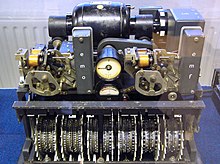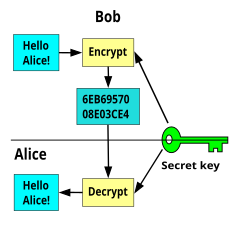
Back Kriptografie Afrikaans تعمية (تخصص) Arabic كريپطوݣرافيا ARY Criptografía AST Kriptoqrafiya Azerbaijani Криптография Bashkir Kryptographie BAR Крыптаграфія Byelorussian Крыптаграфія BE-X-OLD Криптография Bulgarian



Cryptography,[1] or cryptology, is the practice and study of hiding information. It is sometimes called code, but this is not really a correct name. It is the science used to try to keep information secret and safe.
Modern cryptography is a mix of mathematics, computer science, and electrical engineering. Cryptography is used in ATM (bank) cards, computer passwords, and shopping on the internet.
When a message is sent using cryptography, it is changed (or encrypted) before it is sent. The method of changing text is called a "code" or, more precisely, a "cipher". The changed text is called "ciphertext". The change makes the message hard to read. Someone who wants to read it must change it back (or decrypt it). How to change it back is a secret. Both the person that sends the message and the one that gets it should know the secret way to change it, but other people should not be able to. Studying the cyphertext to discover the secret is called "cryptanalysis" or "cracking" or sometimes "code breaking".[2][3]
Different types of cryptography can be easier or harder to use and can hide the secret message better or worse. Ciphers use a "key" which is a secret that hides the secret messages. The cryptographic method needn't be secret. Various people can use the same method but different keys, so they cannot read each other's messages. Since the Caesar cipher has only as many keys as the number of letters in the alphabet, it is easily cracked by trying all the keys. Ciphers that allow billions of keys are cracked by more complex methods.
Since the time of Caesar, many improved cyphers have been made. Some involved clever mathematics to resist clever cryptanalysis. During the 20th century computers became the principle tool of cryptography.
- ↑ The word comes from Greek κρυπτός, kryptos, "hidden, secret"; and γράφω, gráphō, "I write", or -λογία, logia, respectively)Liddell and Scott's Greek-English Lexicon. Oxford University Press. (1984)
- ↑ Kahn, David 1967. The Codebreakers – the story of secret writing. ISBN 0-684-83130-9
- ↑ Newton, David E. 1997. Encyclopedia of cryptology. Instructional Horizons, Santa Barbara, p58. ISBN 1-85109-323-0
© MMXXIII Rich X Search. We shall prevail. All rights reserved. Rich X Search